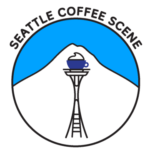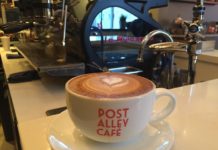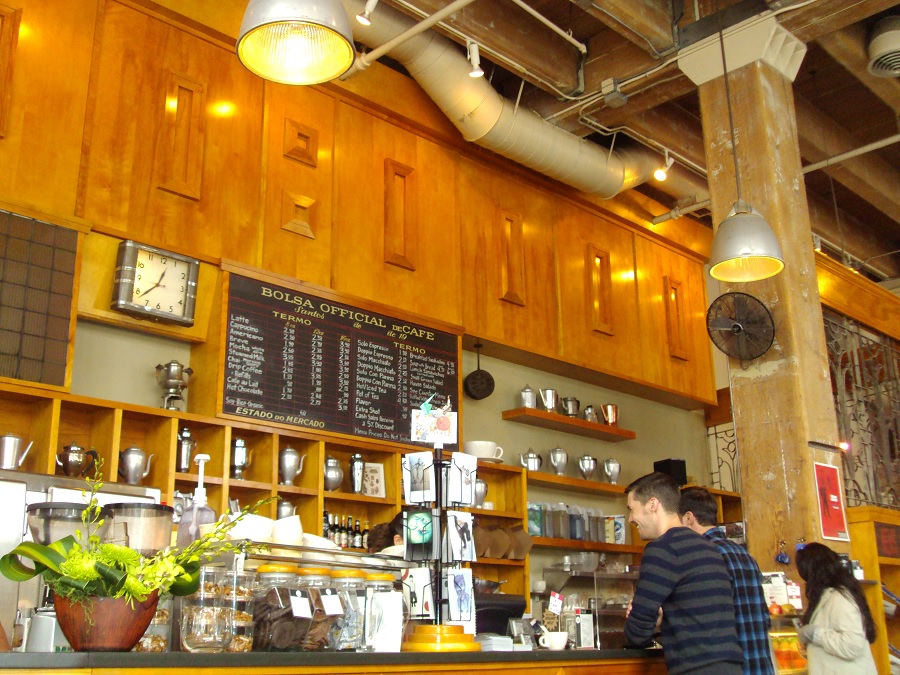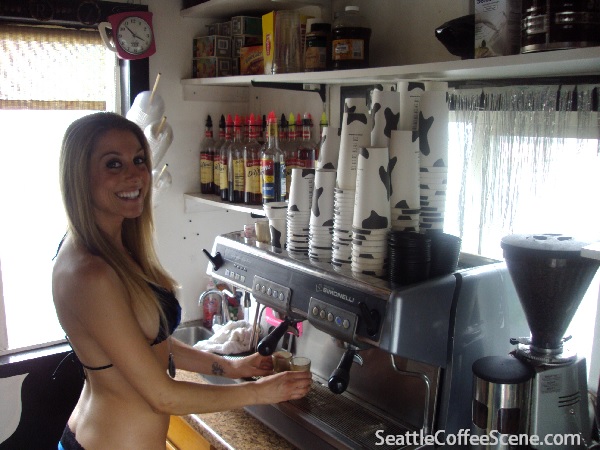The Most Experienced Barista in America is in Seattle, of Course.
“I’m just dancing up here today,” the man squaring off with the espresso machine says with a smile.
“Well then, I am going to ask you for the next dance!” a customer standing behind me yells in response.
As if choreographed, a hungry coffee grinder is fed, switches are flipped, and steam whistles as the barista gently laughs and asks me what I would like drink.
That was a few months ago now, but I would soon come back to the Bulldog News Stand in Seattle’s University District and spend a bit more time with this man behind the counter.
Seattle Espresso During the Ford Administration
When Nathaniel Jackson first started pulling espresso shots, President Ford was in the White House, the Vietnam War was near its end, and price of gas was about 53 cents a gallon. That was 37 years ago and there is no telling how many coffees he’s actually made, but by doing some rough math, it’s probably in the tens of thousands.
He is, by all accounts, the most experienced barista still working today in the United States.
When I meet Mr. Jackson again at the Bulldog News the weather is a bit warmer though Seattle’s pregnant clouds are still lingering overhead. I’m anxious to talk with him while he glides behind the counter.
“How did you get started in coffee?” I ask him. He tells me that he’s always been into the coffee scene, though things were much different in the 1960’s and early 70’s.
Seattle Coffee History: The Last Exit
“We would go to The Last Exit, a bohemian coffee house before Allegro opened. It was a place were friends gathered, older people came to played chess, and the food was cheap and good,” he said, laughing. “It was a true coffee society,” he remembers fondly.
The Last Exit was a University District institution ran by a charismatic man by the name of Irv Cisski. Its traditions lay in the beatnik era, where coffee houses were places that politics were discussed, social discussions occurred among strangers, and poetry readings were standard – many of which were slowly digested in a cigarette smoked rooms across the country.
“What was the coffee scene like back in then?” I follow up.
Mr. Jackson, pauses, starts up the espresso machine again.
“That café society [back then] was built on conversations… discussing the news of the days or books we’ve been reading…we had the full range of human experiences and enjoyed each other’s company,” Mr. Jackson said.
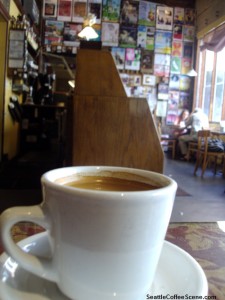
Then one day, Jackson explains, as he was walking through an alleyway in the U District, he had noticed the opening of a new café, called Cafe Allegro, which is now noted to be Seattle’s oldest coffee shop. It was first opened by David Olsen, who would later be tapped to work with Starbucks and is still an executive there.
The first week Café Allegro opened, Mr. Jackson approached Olsen, and asked if he could help out and simply work for free in exchange for being taught the rudiments of coffee making.
At first, Jackson says, Mr. Olsen didn’t respond to his offer of working for free. But a month later in 1975 – many years and even decades before many of today’s baristas were born – Jackson would be hired to serve espresso. Allegro become the go-to café and embodied the changing and ever-evolving coffee scene.
“It was a magical period for the district,” he recalls.
Hired by David Olsen, Now Starbucks Executive
After being hired in 1975 by Olsen, he would help craft a new kind of coffee house that would shape the way Americans would soon be experiencing coffee. Mr. Jackson was actively involved in experimenting with different ideas to foster a sense of community.
“Dave Olsen gave us the room to create that space. Allegro was always a work in progress. The employees and customers defined that space,” he added about those first years.
Without really knowing it or perhaps reluctant to take credit for it, Mr. Jackson would be one of the pillars of the American Coffee Scene.
“In a sense, Café Allegro was a prototype for what Starbucks later became, a neighborhood gathering place…”writes Starbucks CEO, Howard Schultz, in his book, Pour Your Heart Into It, about the impact that Café Allegro would have on the coffee in America.
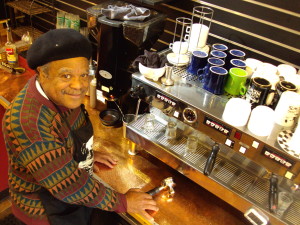 This year, Jackson celebrates his 70th birthday and he’s still going strong, serving espresso every morning to a revolving student body and longtime friends and neighbors.
This year, Jackson celebrates his 70th birthday and he’s still going strong, serving espresso every morning to a revolving student body and longtime friends and neighbors.
Originally from Virginia, he would graduate from Morehouse College in Georgia and would serve in the Peace Corps. He taught briefly and went back to school to study anthropology and psycholinguistics after his service, but then, he says, he got caught up in the social upheaval of the 1960’s and early 1970s and looked elsewhere for his continued education.
He would settle in Seattle in 1969 and dove his energies into natural foods and the study of Buddhism.
Mr. Jackson remembers the first time trying coffee. “It was a revelation of the possibilities of experiencing coffee.” He never looked back.
Coffee is All About the Community
But coffee, he insists, is much more than the sum of its parts. “Coffee is a catalyst for community,” he tells me.
In 1991, Mr. Jackson became co-owner of Café Allegro, along with Chris Peterson, who is still the current owner. For twenty years, as new cafes popped up around him, he ran Café Allegro with the passion of making it community-centered.
After a needed break, he walked away from ownership of the café four years ago to “rediscover Seattle.”
With nearly four decades of serving coffee, he’s seen a lot of changes over the years. Some of which he readily admits are glad they are gone.
In the video below, Mr. Jackson, explains how you got hired as a barista 37 years ago.
Seattle Coffee Scene’s Cycles for Nathaniel
A barista and a hands-on café owner has a unique perch by which to view the pulse of a community. He notes three cycles of his career. The first being between 1975 thru 1981, where he describes a relaxed coffee atmosphere in Seattle. The second phase was between 1981 through about 2006, a period where there was “a lot of focus on money and people become uncomfortable in each other’s company.”
He even noted the social change that began in the 1980s. “People started wearing power suits. There was a coldness in the air… Reagan put a chill on the social scene that lasted until the middle of Bush’s (II) administration,” he described to me.
The third cycle, Jackson says, is where we are now. “It’s a bit more relaxed. “There’s a realization that we should start communicating with one another.”
Jackson has always believed coffee has this ability to bring people together for sharing information. When he trains baristas, he instills that it’s not only about the coffee. The coffee business, he instructs, is about relationships.
“So, what’s your secret to a great cup of coffee?” I ask him.
“Love,” he replies. “Love.”
“Love. That’s it.”
Jackson spend years studying and practicing Buddaism and Zen meditation and incorporates that training every day he works.
I look at making coffee as way to meditate. “Focus on breathing in and breathing out and putting myself in a meditative mindset where I develop a quiet internal place.”
After all these years, Jackson couldn’t think having done anything else. “I really enjoy what I do,” he adds. “I enjoy the contact I have with people, I’m truly interested in shaping of ideas and communicating with others.”
“I try to honor the gift my parents gave me… the ability to interact with people on a large scale,” he said. Both of his parents were teachers and his grandmother also nurtured a creative energy.
If you’re in the University District, stop by and say hello to Mr. Jackson. He’d love to talk to you about Seattle’s Coffee Scene – from the past and present.
Bulldog News, University District, Seattle.
[mapsmarker marker=”45″]
Baristas Make Our World Go Round
Are you interested in being a barista. Even baristas with no experience can be amazing at building coffee drinks. Visit Barista Training Academy for more information.
